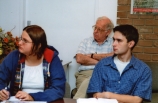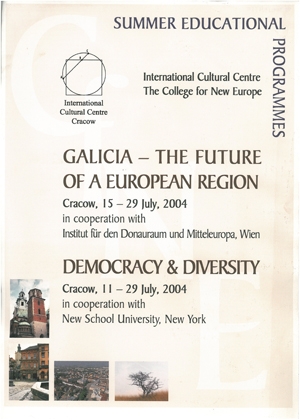
Institut für den Donauraum und Mitteleuropa
01.01.1995 - 01.01.2009
W roku 1994 zainicjowano letnie programy partnerskie z Mitteleuropazentrum, Krems/ Institut für den Donauraum und Mitteleuropa, Wiedeń, z których pierwszy Political & Cultural Change in Central Europe zainaugurował programy binacjonalne w programie edukacyjnym MCK. We współpracy z austriackim partnerem zorganizowano 16 kursów, w których wzięło udział 370 uczestników; w następnych latach zorganizowano sesje poruszające problemy integracji europejskiej. Od maja 2004 roku Ukraina stała się bezpośrednim sąsiadem Unii Europejskiej i jej przyszłym partnerem, w związku z tym – odpowiadając potrzebie chwili – następne sesje poświęcone zostały sąsiedzkiej współpracy i rozwojowi demokracji na Ukrainie, a także teoretycznym i praktycznym aspektom dziedzictwa w kontekście pamięci historycznej. Z punktu widzenia Europy Środkowej rozpatrywano problem kształtowania przestrzeni miejskiej historycznych miast, znaczenia dziedzictwa komunizmu dla pamięci zbiorowej, polityki i dalszych perspektyw rozwoju, a także polityki kulturalnej.

Dr Emil Brix
Historyk, dyplomata; ambasador i dyrektor generalny Departamentu Polityki Kulturalnej w Ministerstwie Spraw Zagranicznych Austrii, sekretarz generalny Österreichische Forschungsgemeinschaft w Wiedniu; zastępca przewodniczącego Institut für den Donauraum und Mitteleuropa w Wiedniu; w latach 1990-1995 pierwszy Konsul Generalny Republiki Austrii w Krakowie; w latach 1995-1999 dyrektor Austriackiego Instytutu Kultury w Londynie; wykładowca College for New Europe przy Międzynarodowym Centrum Kultury w Krakowie; autor wielu prac historycznych z okresu późnej Monarchii Habsburskiej, ze szczególnym uwzględnieniem jej tożsamości narodowej i konfliktów etnicznych
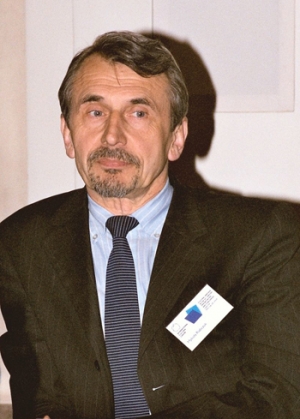
Prof. Mykoła Riabczuk
Ukraiński krytyk literacki, eseista i publicysta, poeta. Redaktor czasopism „Krytyka” i “South Eastern Europe”, współpracownik „Nowej Europy Wschodniej”. W Polsce publikował swoje teksty m.in. na łamach "Więzi", "Tygodnika Powszechnego", "Krasnogrudy", "Czasu Kultury", "Akcentu", "Dekady Literackiej", "Kultury Enter". Pracownik naukowy Ukraińskiego Centrum Badań Kulturologicznych oraz Centrum Studiów Europejskich Uniwersytetu „Akademia Kijowsko-Mohylańska”. Prowadzi wykłady w wielu krajach, m. in. w Polsce, Kanadzie oraz USA. Opublikował kilka książek na temat społeczeństwa obywatelskiego, procesów powstawania państw i narodów, tożsamości narodowej, nacjonalizmu i transformacji postkomunistycznej na Ukrainie. Dwie jego prace zostały przetłumaczone na język polski: Od Małorosji do Ukrainy (Kraków 2002), Dwie Ukrainy (Wrocław 2004). Odznaczony wieloma nagrodami, m. in. Fundacji Antonowiczów (2003), Fundacji Polcul (1997) oraz Odznaką Honorową Bene Merito (2009).
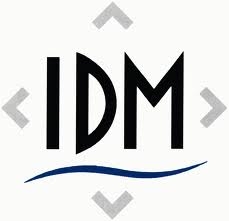
Institut für den Donauraum und Mitteleuropa
Institut für den Donauraum und Mitteleuropa /Instytut Regionu Dunaju i Europy Środkowej (IDM) w Wiedniu. Instytut zajmuje się aktualną problematyką dotyczącą Regionu Dunaju oraz Europy Środkowej, poprzez swą działalność umożliwia poszerzenie wiedzy na temat tego regionu, promuje politykę dobrego sąsiedztwa, zachęca do publicznej debaty. Instytut organizuje seminaria, wykłady i sympozja, prowadzi działalność badawczą i wydawniczą.
Przejdź na stronę instytucji
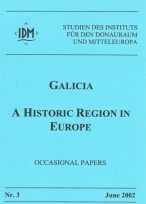
Fragmenty esejów
„…I would like to propose, referring to the history of symbolic mapmaking, that at the beginning of the twenty-first century, the idea and reality of a memorialised „Galicia” serves three key functions: (1) as a subtle continuation and revival of the Mitteleuropa debate surrounding Milan Kundera’s well-known 1984 essay 18 ; (2) as an overcompensation for the crises of “homogenous” or “ethnocentric” national narratives in Austria, Poland, Ukraine and the Jewish Diaspora; and (3) as a novel but nostalgic form of Euro centrism, once again advocating “the return to Europe” by assuming the applicant rhetoric of multicultural liberal democracies and consumer societies across regional borderlines. 19” Steven Seegel (USA): Maps for a Kitschy Atlantis: The Boundaries of Galician Cartography and Mitteleuropäische Identitäten w: Galicia. A Historic Region in Europe; Studien des Instituts für den Donauraum und Mitteleuropa, Nr. 3, June 2002
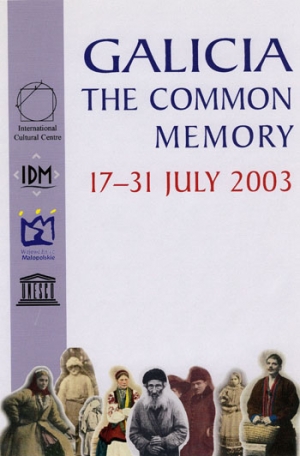
Fragmenty esejów
“The rich heritage of the multicultural times of the Austrian-Hungarian Monarchy should be preserved or used for the European Union and European policy making now, because it had a lot of federal elements in it, especially on the fields of culture policy etc. which can be used to solve the problems of European statehood today….” Eva Dangerdorf (Niemcy): Galician Identity – Progress or an Invention of the Austrian-Hungarian Monarchy? w: Galicia – The Common Memory; Studien des Instituts für den Donauraum und Mitteleuropa, Nr. 4, June 2004
„I’d like to say, that in my opinion one of the greatest successes of the summer school was to bring people of different nations together and I’m very thankful for that because each of the participants became a part of my personal myth about their country, that’s great, and nothing better could happen than inviting each other and staying in contact. That’s the power of plurality. Objective information and positive personal experiences are the most appropriate possibilities to oppose and resist prejudices and fears……” Stefan Bammer (Austria): Myths and National Identity w: Galicia – The Common Memory; Studien des Instituts für den Donauraum und Mitteleuropa, Nr. 4, June 2004
“Galicia. Before coming to the summer school, I didn’t really believe in this region. The information I got from the usual sources was really not sufficient to create a coherent picture of Galicia, something was missing, and I was not able to catch the soul of it. During the summer school I found it – thanks to the teachers, thanks to real Galicians and the real Galician atmosphere and – maybe a bit surprisingly – also thanks to my colleagues from all over Europe. I believe that all of us are now participating in the common memory of this region and I guess it could have been the goal.” Lenka Hušková (Czechy): About the Charms of Galicia. Ghosts of the Past, looking for some Place in the World and what it has to do with my Life w: Galicia – The Common Memory; Studien des Instituts für den Donauraum und Mitteleuropa, Nr. 4, June 2004


